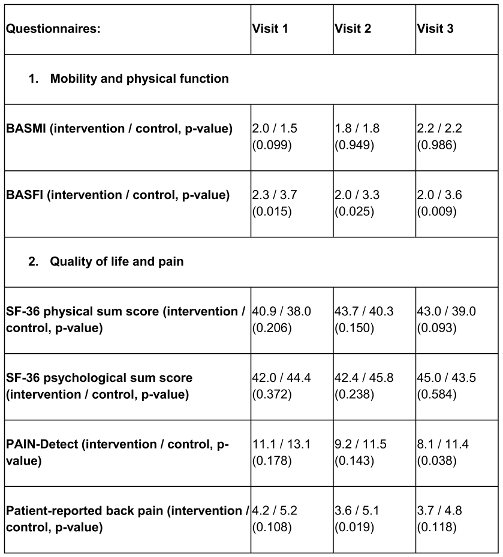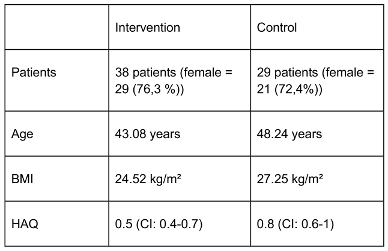Deutscher Rheumatologiekongress 2025
Deutscher Rheumatologiekongress 2025
Efficacy of supervised online yoga in combination with movement coaching compared to physiotherapy in patients with Spondylarthritis: Impact on spinal mobility, physical function, pain, and quality of life
Text
Introduction: Spondylarthritis (SpA) is an inflammatory disease primarily affecting the spine. Besides pharmacological treatments, physical therapy is a key component in SpA management, preventing stiffness and physical limitations.
Previous research has demonstrated the benefits of yoga on quality of life (QoL) and disease activity in patients with rheumatoid arthritis; however, evidence for its effects on SpA remains limited. This study aims to evaluate the impact of a supervised online yoga intervention on spinal mobility, physical function, QoL and pain in patients with SpA.
Methods: Patients diagnosed with SpA (according to ASAS criteria) were enrolled after providing written informed consent. The patients had chronic back pain (> 3 months) and no change in medication with stable disease activity.
Patients in the intervention group engaged in a supervised online 12-week yoga class (60 minutes/week), followed by 12-weeks of self-guided yoga practice at home using the “YogiTherapy” app for support. Before this, the patients received movement coaching to clarify problems, wishes and motivation in relation to physical activity. The control group attended at least one 30-minute physiotherapy session as standard of care treatment per week over a total duration of 24 weeks. (Trial Registration: DRKS00030719)
The following outcomes were assessed at baseline (Visit 1), after 12 weeks (Visit 2), and after 24 weeks (Visit 3) by questionnaires and measurements: spinal mobility: Bath Ankylosing Spondylitis Metrology Index (BASMI; range: 0–10), physical function: Bath Ankylosing Spondylitis Functional Index (BASFI; range: 0–10), quality of life: Short Form-36 (SF-36; range: 0–100), pain: PAIN-Detect (range: 0–38) and patient-reported back pain (range: 0–10). All results are reported as means.
Results: Data from 67 patients were analyzed and included in this study. Baseline characteristics can be seen in Table 1 [Tab. 1].
The results can be seen in Table 2 [Tab. 2].
Table 2: Results of mobility, physical function, quality of life and pain
Conclusion: We conclude that a supervised online yoga program in combination with movement coaching leads to improvements in the measured outcomes. These findings suggest that the intervention may be beneficial in enhancing patient well-being, but they also show that a controlled intervention achieves better results than self-performed physical activity. Further research is warranted to confirm these effects in larger randomised cohorts.
References
[1] Dagfinrud H, Halvorsen S, Vøllestad NK, Niedermann K, Kvien TK, Hagen KB. Exercise programs in trials for patients with ankylosing spondylitis: do they really have the potential for effectiveness? Arthritis Care Res (Hoboken). 2011 Apr;63(4):597-603. DOI: 10.1002/acr.20415[2] Singh J, Metri K, Tekur P, Mohanty S, Singh A, Raghuram N. Tele-yoga in the management of ankylosing spondylitis amidst COVID pandemic: A prospective randomized controlled trial. Complement Ther Clin Pract. 2023 Feb;50:101672. DOI: 10.1016/j.ctcp.2022.101672





